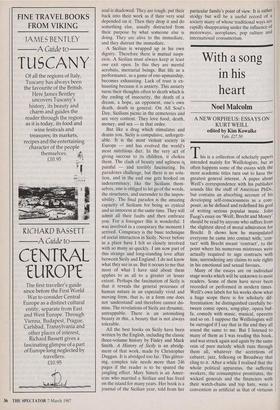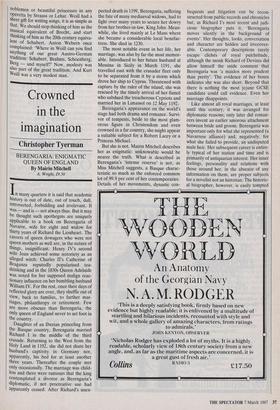With a song in his heart
Noel Malcolm
A NEW ORPHEUS: ESSAYS ON KURT WEILL edited by Kim Kowalke Yale, L27.50 This is a collection of scholarly papers intended mainly for Weillologists; but as often happens some of the essays with the most academic titles turn out to have the greatest general interest. A paper about Weill's correspondence with his publisher sounds like the stuff of American PhDs, but contains an absorbing account of his developing self-consciousness as a com- poser, as he defined and redefined his goal of writing serious popular music. John Fuegi's essay on 'Weill, Brecht and Money' should be read by anyone who suffers from the slightest shred of moral admiration for Brecht. It shows how he manipulated everyone he came into contact with; 'con- tact' with Brecht meant 'contract', to the point where his numerous mistresses were actually required to sign contracts with him, surrendering any claims to sole rights in his emotional and sexual favours.
Many of the essays are on individual stage works which will be unknown to most readers. Some of them have never been recorded or performed in modern times. Weill's own labels for his works show what a huge scope there is for scholarly dif- ferentiation: he distinguished carefully be- tween comic opera, song-play, opera buf- fa, comedy with music, musical, operetta and so on. I suppose the Weillologists will be outraged if I say that in the end they all sound the same to me. But I listened to many of them as I was reading this book, and was struck again and again by the same vein of pure melody which runs through them all, whatever the accretions of cabaret, jazz, folksong or Broadway that cling to it. After a while I realised that the whole political apparatus, the suffering workers, the consumptive prostitutes, the wicked generals and the financiers with their watch-chains and top hats, were a convention as artificial as that of virtuous noblemen or beautiful princesses in any operetta by Strauss or Lehar. Weill had a sheer gift for writing songs, it is as simple as that. We should stop thinking of him as the musical equivalent of Brecht, and start thinking of him as the 20th-century equiva- lent of Schubert. Anton Webem once complained: 'Where in Weill can you find anything of our great Austro-German tradition: Schubert, Brahms, Schoenberg, Berg — and myself?' Now, modesty was also part of the great tradition. And Kurt Weill was a very modest man.



























































 Previous page
Previous page